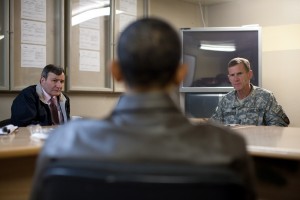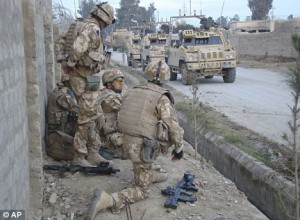Monday
Mar292010
UPDATED Afghanistan Special: Mr Obama's Wild Ride --- Why?
 Monday, March 29, 2010 at 8:17
Monday, March 29, 2010 at 8:17  OBAMA WITH AMBASSADOR EIKENBERRY AND COMMANDER MCCHRYSTAL
OBAMA WITH AMBASSADOR EIKENBERRY AND COMMANDER MCCHRYSTALUPDATE 0925 GMT: We've added new information and analysis.
So let me get this right. The President of the US devotes 25 hours to a round-trip flight to spend six hours in Afghanistan, of which a total of 20 minutes is with the Afghan President?
Why?
Afghanistan Video: Obama Speech to US Troops (28 March)
1. Was Obama delivering a message to Afghan leader Hamid Karzai that he could trust to no one else? If so, what could that important message be? A dressing down of Karzai? (But note that Obama's special envoy Richard Holbrooke, who is persona non grata in Afghanistan after last August's post-election shouting match with Karzai, did not make the trip.) Confirmation that the US military was going to pursue the offensive, long dangled before the media, against the southern Afghan city of Kandahar?
2. Or was this just a giant pep talk/photo opportunity for Obama in front of US troops overseas?
3. Or both?
Have to honest here: I don't have an answer to this puzzle. Nor, however, do many in the "mainstream" media. The BBC, in stolid BBC tones, tried to get away with "reassurance to Afghan allies" who had not been visited by Obama during his Presidency --- frankly, that's pretty lame, since the President could have done this in a more organised and less last-minute fashion. (Even this was muddled in White House statements to the press: some advisors said the Afghans only had an hour's notice; some said Karzai's office was told last Thursday.) CNN has no information beyond the asserted "need to wipe out terror networks".
Helene Cooper of The New York Times proclaims:
President Obama personally delivered pointed criticism to President Hamid Karzai in a face-to-face meeting on Sunday, flying here for an unannounced visit that reflected growing vexation with Mr. Karzai as America’s military commitment to defeat the Taliban insurgency has deepened....
While Mr. Obama said “the American people are encouraged by the progress that has been made,” as he stood beside Mr. Karzai at the heavily fortified presidential palace, Mr. Obama also emphasized that work remained to be done on the governance issues that have frustrated American officials over the past year. “We also want to continue to make progress on the civilian process,” Mr. Obama said. He mentioned several areas, including anticorruption efforts and the rule of law.
The problem with Cooper's supposed scoop of an answer is that it is based on cherry-picking Obama's public statement to the press after his brief encounter with Karzai. As she admits --- lower in the story --- "the language used by Mr. Obama and Mr. Karzai in their private discussions was not disclosed". So here's the key message:
Gen. James L. Jones, the national security adviser, told reporters on Air Force One en route to Afghanistan that the administration wanted Mr. Karzai to “understand that in his second term, there are certain things that have not been paid attention to, almost since Day 1.”
General Jones said that the Afghan president “needs to be seized with how important” the issue of corruption, in particular, is for American officials.
Washington Post reporters take the same line, quoting Jones, "In [Karzai's] second term, there are certain things that have not been paid attention to, almost since Day One." More significantly, the Post gets confirmation from a Karzai adviser and former Foreign Minister, Rangin Spanta, that the discussion with Obama focused on corruption, reconstruction, and "strengthening Afghan state entities".
An EA reader passes on the slightly different take on Al Jazeera English TV that the President's message was that Karzai should take on a more commander-in-chief role regarding the war so that it eventually becomes Karzai’s war instead of Obama’s. Al Jazeera English's website, however, sticks with the corruption-first theme.
Whichever of the versions you choose above, here's the take-away point: the Americans are now so distrustful of Karzai that the President had to personally lay down the law, taking more than a day out to deliver the message. The supposedly regular conference calls between Obama and Karzai just wouldn't do. If true, that tells you how solid this US-Afghan relationship is and/or how big the stakes are going to be in the near-future.
But then pause for a moment: if this was really the key meeting to declare the big push against the Taliban and other insurgents, why no more than 30 minutes? Surely a momentous decision like this would merit just a bit more discussion. Did Obama take only a half-hour because he wanted to show who was boss, giving Karzai no more of his time? Or did Karzai --- the man who secured a dubious election win in defiance of the US Government, who sent Obama's envoy packing, who has reduced the US Ambassador to a shamed figurehead --- set the limit?
My suspicion is that Washington, on the verge of a military show that will test Obama's decision to follow his commanders and go boots-first in the US intervention, still isn't secure about the Afghan President. If so, however, the Obama Administration has just fired its biggest shot possible, short of trying to toss Karzai out. There is no more political space if Karzai continues to be a corruption/drug/mismanagement/backroom-dealing problem.
And in the case, the American ride will be far wilder than that taken by Mr Obama in the last 48 hours.

